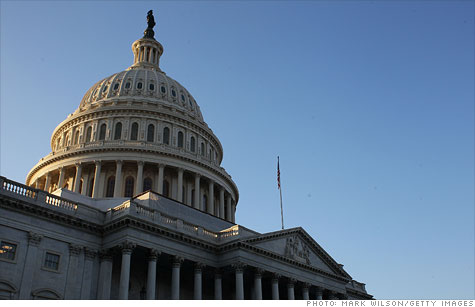Search News

Congress has left uncertain the fate of bonus depreciation, the research and development credit, and a host of other now expired business tax breaks that companies rely on.
NEW YORK (CNNMoney) -- The last legislative freight train has left the station, and a set of expired business tax breaks that regularly get extended was left on the platform.
That's because Congress did not include them in a deal passed Friday that extends the payroll tax cut, the Medicare "doc fix" and emergency unemployment benefits. And now Washington observers expect that will be it for most serious legislation before the Nov. 6 presidential election.
There's a chance those tax breaks -- which include the research and development credit and a deduction that lets businesses accelerate depreciation on their equipment purchases -- will eventually get extended for 2012 and be made retroactive to Jan. 1.
But that may not happen until the end of the year, when Congress engages in what's likely to be an epic fight over extending the Bush tax cuts and cutting spending.
In the meantime, businesses are left wondering whether to go ahead and, say, buy equipment without knowing whether a tax break will be made available later.
"Businesses need certainty and predictability. Retroactive tax policy simply does not achieve this goal," Caroline Harris, chief tax counsel of the U.S. Chamber of Commerce, told the Senate Finance Committee last month.
For one thing, "it takes a lot of the effectiveness out of these incentives," said Clint Stretch, managing principal of federal tax policy at Deloitte Tax.
For instance, businesses' willingness to finance projects or their ability to convince financing partners to take a risk on those projects may be compromised if they worry that a host of expired energy credits -- not all of which have bipartisan support -- won't be extended for 2012, Stretch said.
The R&D credit is a different story. Unlike the energy credits, it does have solid bipartisan support and most expect it will be renewed. So businesses are likely to act as if it has been. "But they won't feel good about it," Stretch said.
That's because their quarterly financial statements can't reflect the benefit of the R&D credit before it's extended. So those statements will look worse than they actually are until Congress extends the break.
The uncertainty factor that surrounds the business tax extenders is amplified this year since Congress is actively talking about tax reform. A key part of reform -- which few expect to happen before 2014 - will be deciding which of the temporary tax breaks to make permanent and which to jettison for good.
Ultimately, though, that could work to the advantage of businesses and the economy, since companies will have more certainty than they do now about what they can expect in the tax code from year to year.
That's the theory anyway.
In the meantime, the road to achieving that certainty is likely to be a bumpy ride. ![]()
| Overnight Avg Rate | Latest | Change | Last Week |
|---|---|---|---|
| 30 yr fixed | 3.80% | 3.88% | |
| 15 yr fixed | 3.20% | 3.23% | |
| 5/1 ARM | 3.84% | 3.88% | |
| 30 yr refi | 3.82% | 3.93% | |
| 15 yr refi | 3.20% | 3.23% |
Today's featured rates:
| Latest Report | Next Update |
|---|---|
| Home prices | Aug 28 |
| Consumer confidence | Aug 28 |
| GDP | Aug 29 |
| Manufacturing (ISM) | Sept 4 |
| Jobs | Sept 7 |
| Inflation (CPI) | Sept 14 |
| Retail sales | Sept 14 |